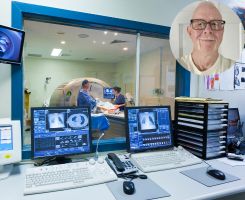Lung cancer screening
Wishart’s journey in the Navy began in 1970 when he served with the P3 Squadron as a mechanic and hydraulics specialist in California. Several years later, he transitioned to the F-14 Tomcat program in Virginia Beach, splitting his time between land and the USS John F. Kennedy aircraft carrier.
After leaving active duty, Wishart settled in Columbia, South Carolina, where he made regular visits to the William Jennings Bryan Dorn VA Medical Center for annual physicals. In fall 2023, during one of these check-ups, Wishart’s primary care provider referred him to nurse practitioner Theresa Chandler for a lung cancer screening consult.
Given Wishart’s age and history of smoking, Chandler recommended a low-dose CT scan, a decision that would ultimately save his life.
Lung cancer screening and early detection
Wishart’s CT scan revealed a small suspicious mass later confirmed as stage 1 lung cancer, an early-stage where the tumor hasn’t spread to the lymph nodes or other parts of the body. Wishart was promptly referred for a robotic-assisted lung procedure, a minimally invasive alternative to traditional surgery for lung cancer.
The surgery was successful, with all follow-up biopsies and tissue samples returning negative results. Wishart continues to be monitored every six months for any signs of recurrence and will begin a physical therapy program in the fall to help improve his mobility.
“I’m beyond grateful for VA’s commitment to diligent lung cancer screening. Had I not taken that step, I can’t imagine where I would be today,” he said.
Wishart is one of over 8,000 Veterans diagnosed with lung cancer every year, a staggering reminder of the disease’s prevalence. VA’s emphasis on early detection is changing lives by providing every eligible Veteran with systematic, integrated and equitable access to high-quality lung cancer screening. With early detection, the survival rate for this type of cancer is high.
As a cancer survivor, Wishart encourages his fellow Veterans to prioritize lung cancer screening. “Early detection increases the chances of successful treatment and saves lives. Don’t wait to get screened. Just do it,” he added.
Lung cancer screenings
If you are a Veteran between 50-80 years old and are a current or former smoker, contact your local VA health care provider to find out if lung cancer screening is right for you or visit My HealtheVet.
Article Source: https://news.va.gov/136184/lung-cancer-screening/#
